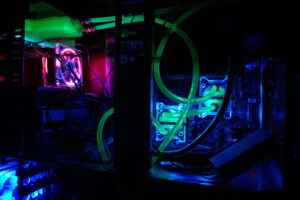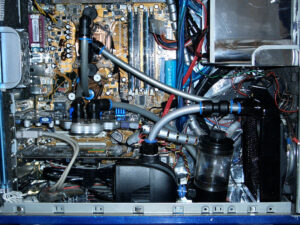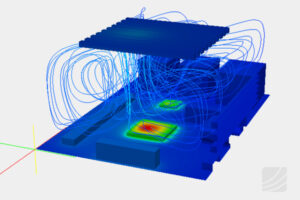Unleashing the true power of your gaming rig requires more than just high-end components; it necessitates meticulous consideration for optimal cooling solutions. When it comes to achieving the ultimate balance between performance and temperatures, the rivalry between air and liquid cooling has been fiercely debated among gamers for years. Each method offers its own set of advantages and disadvantages, leaving enthusiasts to ponder the age-old question: which cooling solution reigns supreme in the quest for the perfect gaming experience? In this article, we embark on a quest of our own to delve into the realms of thermodynamics and uncover the truth behind the eternal competition between air and liquid cooling. So, fasten your seatbelts and prepare to journey through the cooling cosmos as we explore the intricate world of gaming thermoregulation.
Comparing Air and Liquid Cooling Systems: Exploring the Best Cooling Solution for Gamers
When it comes to keeping your gaming rig cool, there are two popular options to choose from: air cooling and liquid cooling. Both systems have their pros and cons, so choosing the best solution for your needs can be a tough decision. In this article, we will explore the differences between air and liquid cooling systems, and help you decide which one is the best fit for you.
Air Cooling:
Air cooling is the traditional and most widely used method for cooling gaming PCs. It relies on a combination of fans and heat sinks to dissipate heat generated by the CPU and GPU. One of the main advantages of air cooling is its simplicity and affordability. Air coolers are easy to install and maintain, making them a popular choice among budget-conscious gamers. However, they may not be as efficient as liquid cooling systems when it comes to dissipating high levels of heat and may produce more noise due to the fans.
Liquid Cooling:
Liquid cooling, on the other hand, is a more advanced cooling solution that utilizes a liquid coolant to transfer heat away from the components. This coolant circulates through a series of pipes and a radiator, with the help of a pump. Liquid cooling systems are highly efficient at dissipating heat and are often favored by gamers who push their rigs to the limits with overclocking. They also tend to operate more quietly than air coolers. However, liquid cooling systems can be more expensive and complex to install, requiring compatible components and a proper setup. They also require occasional maintenance to check for leaks and ensure the system remains in optimal condition.
Conclusion:
Choosing between air and liquid cooling largely depends on your individual needs and preferences. If you are on a budget and don’t plan on pushing your gaming rig to extreme performance levels, air cooling may be the right choice for you. It is affordable and easy to install. However, if you are an enthusiast gamer who demands maximum performance and minimal noise, liquid cooling may be worth the investment. Just keep in mind that it requires more technical knowledge and periodic maintenance. Ultimately, the best cooling solution for gamers is the one that suits your gaming habits, budget, and performance requirements.
Unveiling the Pros and Cons of Air Cooling: Is it the Ideal Choice for Gamers?
When it comes to keeping your gaming rig cool, the choice between air and liquid cooling is a heated debate among gamers. Both options have their own set of advantages and disadvantages, and it ultimately comes down to personal preference and specific needs. Let’s delve into the pros and cons of air cooling and find out if it’s the ideal choice for gamers.
Pros of Air Cooling:
- Cost-effective: Air cooling solutions are generally more affordable compared to liquid cooling setups, making them an attractive option for budget-conscious gamers.
- Simplicity: Air coolers are relatively easy to install and require little maintenance. There are no intricate liquid loops or pumps to worry about, making them a hassle-free choice.
- Reliability: Air cooling systems have been around for a long time and have proven to be reliable. They can efficiently dissipate heat from the CPU, preventing overheating and ensuring stable performance during gaming sessions.
Cons of Air Cooling:
- Less efficient cooling: While air coolers can adequately cool most gaming setups, they might struggle to handle extreme overclocking or high-end processors. Liquid cooling tends to offer better temperature control and can push the boundaries of cooling performance.
- Bulky design: Air coolers often come in large sizes due to the need for large heatsinks and fans. This can limit compatibility with certain PC cases, especially smaller form factors, and may require careful consideration of dimensions before making a purchase.
- Noisy operation: Depending on the fan speed and design, air cooling can generate more noise compared to liquid cooling. This may become a concern for gamers who value a quieter gaming environment, especially during intense gaming sessions.
In conclusion, air cooling has its clear advantages in terms of cost-effectiveness, ease of installation, and reliable performance. However, for those seeking maximum cooling efficiency and are willing to invest more, liquid cooling might be the superior choice. Ultimately, it’s crucial to consider factors like budget, PC specifications, and your personal noise tolerance when deciding which cooling solution is best suited for your gaming needs.
Diving into the Advantages and Limitations of Liquid Cooling: Is it Worth the Investment?
When it comes to ensuring optimal performance and preventing overheating, gamers are always on the lookout for the best cooling solution. Two popular options that often come up in discussions are air cooling and liquid cooling. While air cooling has been the go-to choice for many years, liquid cooling has gained traction in recent times as a more efficient alternative.
One of the primary advantages of liquid cooling is its superior cooling capabilities. Liquid coolers dissipate heat more effectively than air coolers, thanks to the liquid’s higher thermal conductivity. This means that even under heavy loads, your gaming rig will stay at a lower temperature, preventing thermal throttling and ultimately enhancing your gaming experience.
Moreover, liquid cooling offers customization options that air cooling cannot match. With liquid cooling, you can choose from various radiator sizes, fan configurations, and tubing options to fit your specific needs and style preferences. This flexibility allows gamers to build visually stunning and high-performance rigs that stand out from the crowd. Additionally, liquid cooling systems tend to be quieter than their air counterparts, as the fans don’t have to work as hard to keep temperatures in check.
Choosing the Right Cooling System for Your Gaming Rig: Factors to Consider
Factors to Consider
When it comes to choosing the right cooling system for your gaming rig, there are several factors that you need to take into consideration. These factors will help you determine whether air cooling or liquid cooling is the best solution for your needs. Here are some key factors to consider:
- Heat Dissipation: One of the most important factors to consider is how well the cooling system can dissipate heat from your gaming rig. Air cooling relies on fans to push hot air away from the components, while liquid cooling uses a liquid coolant to absorb and dissipate heat more efficiently.
- Noise Level: Gamers often prefer a quiet gaming experience, which means considering the noise level of your cooling system is crucial. Air cooling systems can sometimes be noisy due to the fans’ constant spinning, while liquid cooling tends to operate more silently.
- Installation Complexity: Another factor to consider is the complexity of installing the cooling system. Air cooling is generally simpler to install as it usually involves mounting fans and heat sinks. On the other hand, liquid cooling requires more expertise, involving the installation of a pump, radiator, and tubes.
By evaluating these factors, you can make an informed decision on which cooling solution will suit your gaming rig best. Remember to prioritize your requirements and preferences to find the perfect balance between performance, noise, and ease of installation.
Expert Recommendations: Finding the Optimal Cooling Solution for Gamers
When it comes to keeping your gaming rig cool, selecting the right cooling solution is crucial. Two popular options in the market are air cooling and liquid cooling systems. Both have their strengths and weaknesses, leaving gamers with the question: which one is the best choice? Let’s dive into the expert recommendations and explore the pros and cons of these cooling solutions.
Air Cooling
One of the most common cooling methods for gamers is air cooling. This approach utilizes one or more fans to dissipate heat generated by your computer’s components. Here are some key advantages and disadvantages of air cooling:
- Pros:
- Cost-effective and affordable to install.
- Relatively easy to maintain, requiring minimal attention.
- Provides adequate cooling for mild to moderate gaming setups.
- Cons:
- May struggle to handle extreme overclocking or high-end components.
- Can be noisy at high fan speeds, potentially affecting your gaming experience.
- Heat dissipation efficiency can vary depending on the quality of components and system airflow.
Liquid Cooling
If you’re seeking more advanced cooling capabilities, liquid cooling might be the answer. This solution employs a closed-loop system that uses a combination of liquid coolant and a pump to transfer heat away from your computer’s vital parts. Consider the following advantages and disadvantages of liquid cooling:
- Pros:
- Exceptional heat dissipation, making it ideal for intense gaming sessions and overclocking.
- Reduces overall noise levels significantly compared to air cooling systems.
- Provides a sleek and futuristic aesthetic to your gaming setup.
- Cons:
- Generally more expensive than air cooling, especially for high-performance setups.
- Installation and maintenance can be more complex.
- Potential risk of leaks, although modern designs have reduced this possibility.
- Requires sufficient space inside your computer case to accommodate the radiator and fans.
Closing Remarks
As we embark on the thrilling journey exploring the world of cooling solutions, it is crucial to remember that both air and liquid cooling have their own unique merits. While air cooling asserts its dominance in terms of simplicity and cost-effectiveness, liquid cooling stands tall with its undeniable supremacy in delivering superior performance and temperature regulation.
Whether you are a casual gamer immersing yourself in the world of high frames per second or an avid enthusiast pushing your hardware to its limits, the choice between air and liquid cooling should ultimately be tailored to your individual needs. Consider the space availability, maintenance requirements, budget constraints, and most importantly, the confidence it instills in you to tame the fiery beast lurking within your gaming rig.
Air cooling, like a steadfast companion, never fails to provide reliable performance and efficient heat dissipation. Its widespread availability, ease of installation, and wallet-friendly nature make it an ideal choice for beginners and those seeking fuss-free operation.
On the other hand, liquid cooling emerges as the elegant seductress, tempting adventurers with its sleek aesthetics and unparalleled thermal efficiency. The indulgence of liquid cooling opens doors to limitless possibilities, allowing gamers to explore the unforgiving horizons of overclocking, without breaking a sweat.
Yet, in this vast realm of cooling solutions, it is crucial not to succumb to the whispers of prejudice or fall captive to misconceptions. Instead, let us embrace the mutually beneficial coexistence of air and liquid cooling, recognizing their ability to cater to our diverse aspirations and requirements.
In the realm of gaming, the answer to the ultimate cooling solution lies not in an absolute decree but in the harmony between technology and personal preference. So, dear gamers, take a step back, breathe in the possibilities, and let your choice resonate with your heart’s desire.
As we unveil the curtain on this debate, we find ourselves standing at the crossroads of innovation and tradition, where air and liquid cooling intertwine. Let us celebrate the extraordinary feats achieved by each cooling solution, ever in awe of the boundless creativity, impeccable engineering, and the unwavering passion that fuels the gaming community.
As gamers, we are united by the shared pursuit of incredible experiences, breathtaking adventures, and the quest to push the boundaries of our virtual realities. And whether we choose air or liquid cooling, let us revel in the remarkable journey that brings us together – for in this journey lies extraordinary tales waiting to be etched in the annals of gaming history.
So, my fellow gamers, as you embark on your next gaming expedition, armed with knowledge and a discerning eye, remember to choose your cooling solution with confidence, embracing the essence of creative exploration, and taking joy in the fact that the choice is truly yours.



